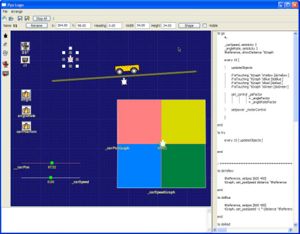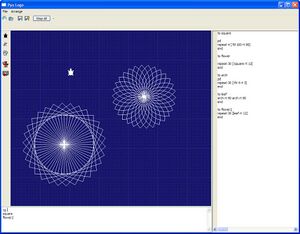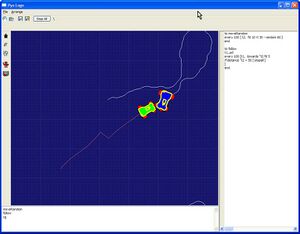PyoLogo: Difference between revisions
Jump to navigation
Jump to search
No edit summary |
No edit summary |
||
| Line 2: | Line 2: | ||
'''PyoLogo''' [pie-o-logo] or '''PYthon Open Logo''' is an implementation of the Logo programing environment created on top of Python. It grew out of Arnan (Roger) Sipitakiat's thesis project at the MIT Media Laboratory. PyoLogo consists of a casual Logo interpreter and a simple IDE. |
'''PyoLogo''' [pie-o-logo] or '''PYthon Open Logo''' is an implementation of the Logo programing environment created on top of Python. It grew out of Arnan (Roger) Sipitakiat's thesis project at the MIT Media Laboratory. PyoLogo consists of a casual Logo interpreter and a simple IDE. |
||
[[Image:screenshot01.jpg|thumb|right]] [[Image:screenshot02.jpg|thumb|right]] [[Image:screenshot03.jpg|thumb|right]] |
|||
==Current Status== |
|||
Since PyoLogo is currently thesis software, it is far from being a complete product. Here is a list of things it can and cannot do. |
|||
* Supports a subset of Logo primitives. |
|||
** Most of the Turtle Geometry (drawing) primitives are available. |
|||
** List and list manipulation commands |
|||
** Common control flow |
|||
** Variables. Using the 'make' command and some other alternatives. |
|||
** |
|||
* Supports multiple procedures with parameter passing and procedure output |
|||
* Multi-threaded. I.e. the 'launch' and 'forever' commands creates a new background process |
|||
Revision as of 23:02, 10 January 2007
PyoLogo
PyoLogo [pie-o-logo] or PYthon Open Logo is an implementation of the Logo programing environment created on top of Python. It grew out of Arnan (Roger) Sipitakiat's thesis project at the MIT Media Laboratory. PyoLogo consists of a casual Logo interpreter and a simple IDE.
Current Status
Since PyoLogo is currently thesis software, it is far from being a complete product. Here is a list of things it can and cannot do.
- Supports a subset of Logo primitives.
- Most of the Turtle Geometry (drawing) primitives are available.
- List and list manipulation commands
- Common control flow
- Variables. Using the 'make' command and some other alternatives.
- Supports multiple procedures with parameter passing and procedure output
- Multi-threaded. I.e. the 'launch' and 'forever' commands creates a new background process


